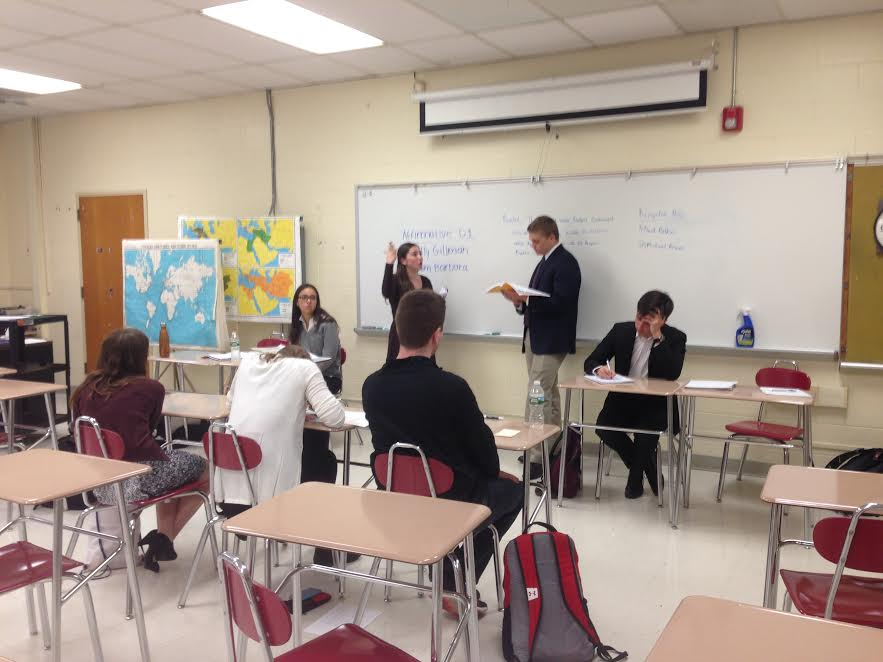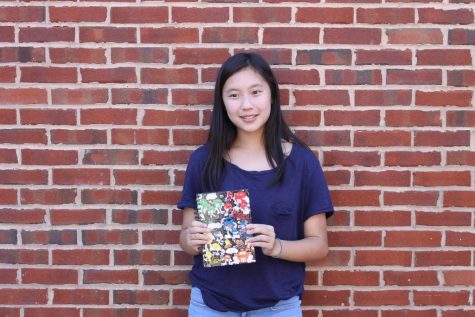Varsity debaters attend their first meet
Photo Credit: Claire Beezley
Co-captain David Belkin and his partner Michael Pesenti compete at Northern Highlands Regional High School.
November 7, 2016
Glen Rock varsity debate team participated in its first meet on Oct. 27 at Northern Highlands Regional High School.
The debate team left school around 8:40 A.M.and came back at 2:15 P.M. They competed against schools from Ramapo, Pascack Hills, Pascack Valley and Ramsey. Varsity debaters from Glen Rock included the two co-captains, David Belkin and Elliot Gincley, and team members Dean Eleftheriades, Michael Pesenti, Andrew Bober, Dylan Needleman, Luke Brangaccio, Hiroki Doyle, Richard Beezley, Stephen Petratis, Matt Heller, and Chris Wu.
“The way it works is each school hosts a debate once and all the schools go to it so it’s not like one school versus another,” Belkin said.
The topic for debate was the same throughout: The United Nations should expand trade or diplomatic relations with China.
The overall result for the school was satisfactory considering there were many new varsity debaters. Belkin and his partner Michael Pesenti got the best result, 3 wins and 1 loss. Wu and Heller went 2 and 2, Beezley and Petratis went 2 and 2,Gincley and Eleftheriades went 1 and 3, and Bober and Needleman went 0 and 4
“The average that you want to aim for is 2 for 2. Win at least two out of four. Hopefully win at least two affirmatives. The two negatives you can at least get really lucky or not really lucky if they have a really good plan,” Gincley said.
Advisors, Paul McCrary and Una Kearns were satisfied with the results from Glen Rock, although Glen Rock didn’t place in the meet.
“They had very well thought out plans.There wasn’t any really weak plan that was presented from any of our debaters and that takes a lot of energy and effort,” Kearns said.
Belkin was proud of how well he and his partner, Michael Pesenti, did. Although it was his partner’s first time debating, Belkin was still happy with the results that they received and hoped to improve going on forward.
“I think specifically it was Mike’s first debate so there was some things he was coming from inexperience, but he’s definitely going to come back better next time just in terms of some specific terms he was unaware of but again it’s a learning experience so we’re going to get better and better every debate,” Belkin said.
Gincley was also pleased with how he and his partner Dean Eleftheriades did considering that it was his first time debating too.
Debating takes a lot of preparation. McCrary and Kearns held meetings during lunch and after school on Tuesdays every week. The debaters received plans and baylors, which are big yellow books with outlines that the students use to research and plan their debates. Kearns and McCrary would be helping them alongside. Not only that, but co-captains Belkin and Gincley would step in and talk about their ideas with suggesting what they should debate about. Debaters need to make sure they have solid plans, go over their plans and make sure that they’re fully prepared. It requires work not only inside of school but outside of school too.
“You have to do a lot of research, you have to think through arguments, and you have to think through where other people can pierce through your arguments,” Kearns said.
Gincley and Eleftheriades spent two nights working together on their plans for this debate. Gincley explains that each pair gets two negatives and two affirmatives each debate. Gincley worked on the first affirmative while Eleftheriades worked on the other.
“What we came to is the whole part of the first debate is the other teams will find holes in that plan and they definitely found holes which is exactly what we wanted, but now what we’re going to do is we’re going to go back tighten up those holes fill in the gaps make it more unstoppable in the following rounds, finding out more stats, more quotes to back up our points and now we know what to look forward to in the next debate,” Gincley said.
The debate team hopes to practice, improve, and gain potential throughout the school year.
“I think they need more confidence speaking. More practice speaking in front of people. We have more teams and more judges and they will be better than last year. It’s the matter of getting experience,” McCrary said.
According to Kearns the team is more organized this year and debaters are putting in extra commitment and effort into the team.
“Mr. McCrary and I tried very hard to put some rules around so that you can’t just say you’re gonna come and not come without consequences. That was a problem last year. So now if you make a commitment, you have to really own up to it or there’s going to be some sort of consequence,” Kearns said.
Belkin sees major improvement of the debate team from last year and expects a bright year ahead for them.
“I just think in general like this year is looking more optimistic than last year like honestly last year a lot of the seniors didn’t take it as seriously. This year we really tightened up. It is harder because there’s a lot more work that we’re putting into it but we expect that extra work to give better results,” Belkin said.
McCrary and Kearns hope to prepare more mock debates, which are scrimmages, for the junior and varsity members to prepare them for their future debates. The debate team is a highly encouraged club that helps students interact with each other and develop life skills.
“I would highly encourage everyone to do debate because after the end of this year, Belkin and I are gone, a lot of the seniors are leaving, and it’s gonna be a huge gap. So I would encourage a lot of people go and do debate. Even if you don’t wanna debate, you can be a judge, you can be a timer,” Gincley explained. “Personally I love debating and I love going up and talking to people. I think it’s fun. It’s enjoyable. So I highly encourage everyone to at least try debating. It’s a lot of work at first, to create a plan,but after that it’s fun.”




